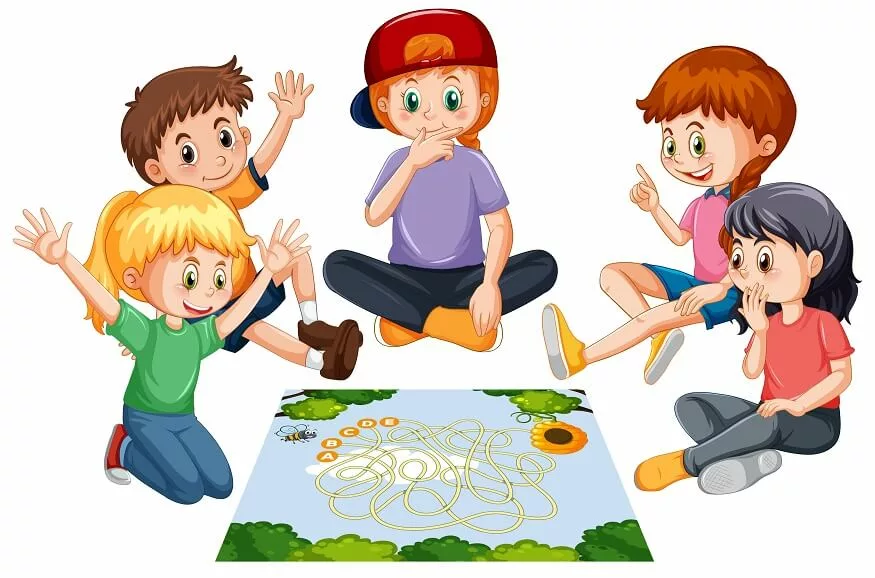Cooperative board games are fast gaining traction in children’s educational journey. Unlike traditional board games where the goal is to outmanoeuvre opponents, cooperative games prioritise teamwork, communication and strategic thinking with all the players working towards a common goal.
These games not only entertain, but they also offer a vast range of benefits for children, encompassing cognitive, social, and emotional growth. In this blog, we will explore the benefits of cooperative board games for kids and why they make an excellent addition to their collection of games.
Also Read: Why are sports and games important in schools?
1) Cognitive benefits
Cooperative board games contribute to children’s cognitive development significantly. They promote strategic thinking, and problem-solving, and help children learn how to make decisions under pressure. To accomplish the shared goals, children must plan, strategize and adjust their tactics based on the unfolding game dynamics, all of which stimulate cognitive growth.
Concentration and memory skills can also be enhanced through these games. As the game progresses, children are required to recall previous game events and information to make informed decisions. The need for sustained attention throughout the gameplay sharpens their focus and concentration, whilst improving memory in an engaging and fun way.
Various cooperative board games require children to analyse a situation, identify obstacles and find solutions as a team. This process enhances their reasoning and decision-making skills building a solid foundation for academic success.
2) Social benefits
Cooperative games foster social interaction and communication skills. Collaborative efforts towards a mutual goal encourage open communication, patience, and respect among players. Children learn to listen to others’ viewpoints, incorporate these into group strategies, and navigate their suggestions through effective communication.
As a part of working together as a team, children learn to assign roles, take up responsibilities and become accountable for their team’s performance. They start to recognize and respect diverse talents that exist within their team leveraging each one’s strength towards the task at hand. One of the most significant benefits of cooperative board games is the ability to collaborate and not compete with each other within their teams. Children are exposed to the principles of working as a cohesive unit to achieve success. They learn to communicate respectfully, share ideas, support each other, accept diverse perspectives, and listen actively to each other.
These are valuable skills for academic, personal and professional growth.
Also Read: The Benefits of Playing Board Games with Family
3) Emotional Benefits
As they progress through the game together, they not only start to understand their emotions, they start to recognise and acknowledge the emotions of their team members as well.
While traditional games foster a sense of competitiveness and loss, cooperative board games create a safe space for them to win or lose collectively. This enhances their confidence, sense of achievement and allows them to take collective responsibility for their actions and consequences.
Since the game’s outcome depends on collective success or failure rather than individual victory, hence, the anxiety to outperform is considerably reduced. This makes cooperative games less stressful and more enjoyable for children.
In addition, when the game concludes, whether in victory or defeat, all players share the result. This shared experience fosters resilience in defeat and humility in victory. Notably, it also encourages a growth mindset, as players learn from their defeats and strive for improvement in subsequent games.
This learning is a valuable lesson for children preparing them for challenges they may face in the future.
Cooperative games nurture empathy and kindness. As players work towards a common goal, they support each other, fostering a caring and supportive environment. This can help children develop their emotional understanding and expression.
Cooperative games are a great way for families to come together and bond. When playing as a team, family members learn to communicate, strategize, and celebrate together strengthening their emotional connection with each other. Spending time together playing brings parents and children together fostering a positive family dynamic.
Also Read: Games and Activities for Kids that Develop Hand-Eye Coordination
Choosing the right cooperative game
Considering the benefits offered by cooperative games, it is essential to understand how to choose the right cooperative game for your child. When looking for a cooperative game consider the age, interest and desired complexity level of the game.
For preschoolers, picking games focussing on recognising colour, textures, objects, counting and matching would be suitable. For older children pick games that require planning, collaboration, teamwork and critical thinking.
For teenagers, pick games that require strategic thinking, problem-solving, coordination, communication and collaboration. Engaging them in games requiring creative thinking and innovation is a fun way to have them develop these skills.
Some examples of popular board games are:
- Outfoxed: Recommended for 5 years and above, the players have to work together to find a guilty fox by discovering clues and eliminating suspects.
- Forbidden Island: Recommended for 5 years and above, the players take on the role of explorers to find a valuable treasure from a sinking island. It is a race against time in the game.
- Hoot owl hoot: The difficulty level of this game can be adjusted depending on the age group. Hence is recommended for preschoolers as well as teens and adults. The goal of the game is to help the owls get back to their home before the sun sets.
- Mysterium: A strategy board game recommended for all ages, players have to work together to solve a murder mystery using visual and abstract clues.
- Pandemic: A game recommended for 10 years and above, it is a popular board game where players become members of a disease-fighting team trying to save the world from deadly outbreaks.
- Flash Point: Fire Rescue: Recommended for a family play, Flash Point, a strategy board game, simulates the high-pressure environment of a firefighting team trying to rescue people from a burning building. Players must strategize and coordinate their actions to save as many lives as possible.\
Also Read: 15 Interesting Geography Games For Kids
Conclusion
Beyond just providing entertainment, cooperative board games for kids offer a wide array of cognitive, social, and emotional benefits. They make an excellent addition to children’s learning journeys offering them engaging, enjoyable experiences.
For more such exciting blogs, visit the EuroSchool website!










